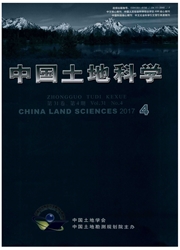

 中文摘要:
中文摘要:
研究目的:以定量评估方法对城镇化的土地资源效应进行评估,从而解决快速城镇化进程中,由于发展方式、发展目标及发展调控的不当所造成的大量土地资源利用及破坏问题。研究方法:含有指标属性的AHP法和标准值判定方法。研究结果:(1)城镇化的土地资源正负效应具有相对性、模糊性和变动性特征,具有正负之间和正负效应内部高低效之间4种转化方式。(2)辽宁沿海经济带城镇化的土地资源效应呈现正效应主导下正负效应不断变化和分化现象。并且从空间来看,正负效应的高低值具有空间转移的趋向。研究结论:构建合理的指标体系,利用AHP法和标准值判定方法,能够准确的评估城镇化的土地资源正负效应,能够准确界定城镇化与土地资源利用的关系,为土地资源利用问题的解决提供方法和数量支持。
 英文摘要:
英文摘要:
The purpose of this paper is to evaluate the effects of land on urbanization, and to solve the practical problems of land utilization due to the inappropriate development mode, objective, and policies. Methods employed are AHP with index attributes and the standard value determination method. The results indicate that 1) the positive and negative effects are relative, fuzzy and dynamic, and there are four transformation patterns between positive and negative effects. 2) The positive and negative effects are dynamically transforming and splitting up between each other while the positive effect is still dominating in the Liaoning coastal economic belt. From the spatial point of view, the positive and negative effects are also transforming among regions. The main conclusion of the paper is that constructing a reasonable indicator system can accurately assess the positive and negative effects and accurately defines the relationship between the urbanization and the land utilization. The findings can provide the method and quantitative evidence for solving the practical problems of land utilization in the region.
 同期刊论文项目
同期刊论文项目
 同项目期刊论文
同项目期刊论文
 期刊信息
期刊信息
